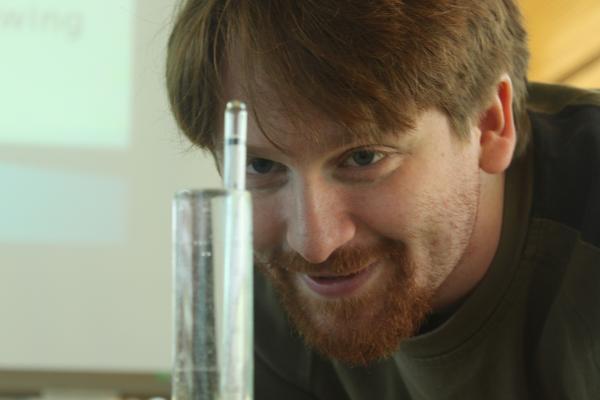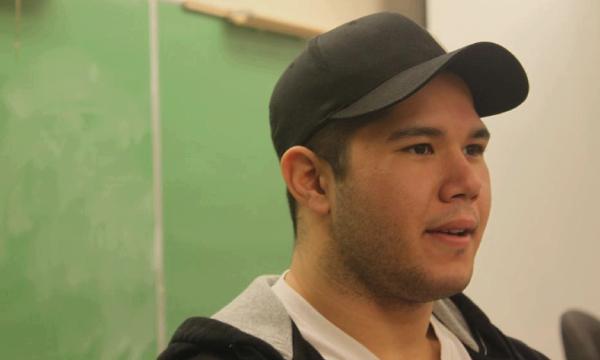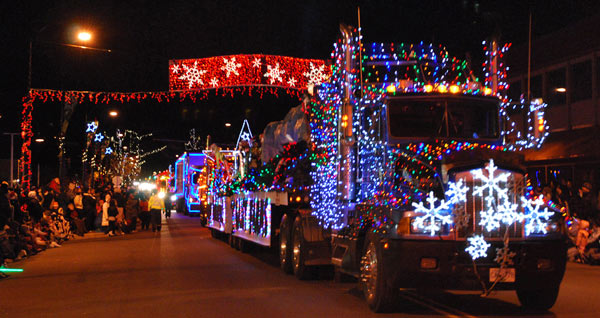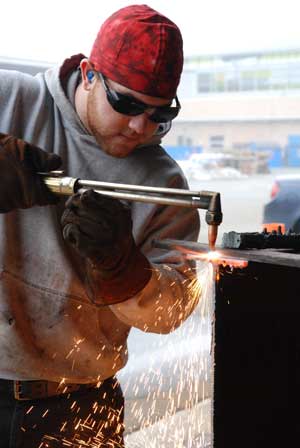KSA seminar teaches do-it-yourself beer-making
January 29, 2010 by Jacob Zinn · 2 Comments

Nathan Griffiths shows how to use a hydrometer to measure alcohol at the Cloverdale campus on Jan. 19. (Jacob Zinn photo)
Who needs a liquor license when students can make their own beer?
On Jan. 19, Nathan Griffiths of the KSA lead a home-brewing seminar at Kwantlen’s Cloverdale campus for about a dozen students, teaching them how to fermented lagers and ales.
“Beer is always popular, definitely an important part of social life,” said Griffiths, who had a copy of Homebrewing for Dummies. “I just wanted to kind of teach them the science and the process and the history, and of course, how to make it yourself for fun and save some money.”
For the KSA, teaching students to make beer is cheaper than getting a liquor license for a special event, which was a factor in making this first of four educational seminars.
Griffiths got into homebrewing after going to a you-brew business and learning the process of brewing batches of beer.
“I find it to be a much more social way to have friends over,” he said. “If they do a batch, I’ll do a batch and we can swap back and forth. That way, you’re not drinking half a keg of one type of beer.”
It’s illegal to distill hard alcohol, but making beer, wine and cider at home is permitted.
Griffiths recommends first-time brewers use a kit, which is often affordable and come with the ingredients needed to make beer: pre-mixed barley, hops, yeast and fine sugar. He stresses that the instruments must be sanitized because any bacteria can ruin a batch.
The process of homebrewing involves boiling sugar and the contents of a kit in water and leaving it in the primary fermenter for a week. Then it is moved into a secondary fermenter for another two to eight weeks (depending on the recipe) to make the beer more flavourful. Another cup of fine sugar is added to create carbonation and the beer is siphoned into bottles for one more week before consumption.
The temperature is also key during fermentation. Ales can be brewed at room temperature, but lagers should be kept at 10 C.
Events such as this are to being held to encourage student life on different campuses. Cloverdale has two more seminars: one on tenant’s rights and another on the B.C. Industry Training Authority for apprenticeships in different fields of work.
Kwantlen, KSA distribute on-campus H1N1 vaccines
January 20, 2010 by Jacob Zinn · Leave a Comment

Brandon Tuason, a history and arts student, thinks it's important for students to get the H1N1 vaccine and keep from spreading the virus through the student population. (Jacob Zinn photo)
In a joint effort, Kwantlen Polytechnic University and the KSA are providing free H1N1 vaccinations this week to students and employees at all four campuses.
Since Tuesday, more than a hundred on-vaccinations have been administered at the Surrey and Richmond campuses.
Lesley England, a registered nurse with ProGroup, said the turnout for vaccinations has been quite good. On Monday, she expected to give 70 vaccinations at the Surrey campus. She gave 88.
By 12:30 p.m. on Tuesday, she’d vaccinated another 45 students on the Richmond campus.
“A lot of people who are getting the H1N1 [vaccine] have never had flu vaccines before,” said England, who is expecting a third wave of the H1N1 influenza virus to arrive in February.
Nurses will visit the Langley campus Thursday and the Cloverdale campus Friday in hopes of immunizing procrastinating students.
When the H1N1 vaccine was being developed last fall, the KSA hoped to include it in the health and dental plan. However, the government purchased enough of the vaccine for all Canadians and offered it for free at clinics.
“It’s readily available now. You can go to your doctor and get the shot,” said Eddie Lee, coordinator of the Student Health Improvement Program.
“However, we know that there are students and employees who probably still won’t go–it’s a lack of convenience for them, so we decided to bring it on campus.”
It’s that inconvenience that has kept Nick Mostar, 22, from finding time for the vaccination.
“I’ve been doing schoolwork and haven’t really had the time to go to a clinic or anything,” said Mostar who is in the engineering program.
Not all students have waited quite as long. Brandon Tuason, 21, got the H1N1 vaccine several months ago. He was at risk of getting the virus because, at birth, he was diagnosed with severe asthma, making him more prone to infection.
“We’re in an environment where everybody’s kinda in close quarters,” said Tuason. “Infections can spread really quickly. I think the school is taking a good initiative in preventing a lot of that by giving the immunization away.”
Homeless find refuge in Surrey suburbs
January 12, 2010 by Jacob Zinn · Leave a Comment
Every night, in the parking lot of a low-rise Whalley building off King George Highway, dozens of workers distribute food and clothing to the homeless at the home base of NightShift Ministries.
Located at 10759 135 St., the outreach program serves the home- less 364 nights a year, providing hot meals, blankets and clothing for the cold and wet with the help of nearly 40 churches.
“We provide for those that don’t have a nourishing meal, that don’t have a fixed address,” said MaryAnne Connor, who founded NightShift in January 2004.
As well as NightShift Ministries, Connor runs a thrift store, located next door, called Sister’s Marketplace, and just down the street is the Surrey Food Bank. She said that residents are quite giving to the homeless and have helped her ministry over the years.
“Ninety-five per cent of our people are volunteers,” she said. “We wouldn’t be able to do it without the generosity of the community.”
Dane Watson of Peace Portal Alliance Church gets to see NightShift make a difference first-hand. He leads a group of Peace Portal volunteers two Saturdays a month, and on those nights, he’s always moved by the people he meets as they come in off the streets.
He recalled a night last fall when he was working in the clothing truck and a man asked for a button-up dress shirt. When he found one, the man’s eyes lit up and he showed much gratitude to Watson.
“He said to me, ‘Bless you, sir. You’ve now made it possible for me to go out tomorrow for a job interview,’” Watson said.
Watson said he knows that other volunteers have had similar experiences, and though some are initially apprehensive about meeting the homeless, he assures them it’s safe and controlled by the ministry.
“In the year and a half that I’ve been doing it, I think I had to call 9-1-1 twice,” said Watson, who acknowledged incidents have happened, but the ministry deals with them and moves on.
Homelessness is less visible here than it is in Vancouver, and compared to the Downtown Eastside, Connor said it’s harder to notice the homeless because Surrey is more geographically spread out.
“It depends on the time of night,” she said. “We serve between 100 and 150 people every night.”
A 2008 report by the Tyee counted 2,592 homeless people in Metro Vancouver, 402 of whom were in Surrey.
“Anyone telling me there’s 400, that’s the actual number of homeless, I would definitely beg to differ,” said Peter Fedos, program manager of Hyland House in Surrey. “If I count just between the three shelters in the area, there’s close to 2,000 different individuals that are seen every year, and I’m turning away 500 per month ’cause I’m full.”
Homelessness in Surrey suburbs such as Fleetwood, Newton and Guildford is hard for local shelters to handle. All of the 35 beds at Hyland’s Surrey location (6595 King George Hwy.) and the 10 beds at the Cloverdale location (17910 Cole- brook Rd.) are full every night.
“Everyone has a different situation that caused them to become homeless,” said Andrea Dodd, assistant program manager of the Cloverdale Hyland House. “Whether it’s mental health, addiction, losing their job, having no support system…. It’s not all just one group or one stereotype of homeless.”
Fedos added that the only thing in common these people have is that they’re homeless or at risk of becoming homeless.”
“A homeless person told me, ‘Don’t confuse someone being homeless with street people,’” said Fedos, who clarified that “street-entrenched” people choose to live on the street and have trouble getting out of the lifestyle.
The street-entrenched are familiar with the street and prefer to be there, according to Fedos.
Cloverdale: Growing community uses events to retain identity
January 12, 2010 by Sarah Jackson · Leave a Comment

A decorated semi tractor-trailer entertains a crowd of thousands during Cloverdale's annual Santa's Parade of Lights. (Photo submitted by Cloverdale Business Improvement Association)
Cloverdale streets were decked out with Christmas lights, crammed with people and covered in decorated semi tractor-trailers and trucks on Dec. 6 at Hawthorne Square.
The Santa’s Parade of Lights, put on by the Cloverdale Business Improvement Association (BIA) in partnership with the Cloverdale District Chamber of Commerce, is one of five annual events held in the area to maintain Cloverdale’s historic small-town identity and strengthen the sense of community.
The Cloverdale BIA was expecting a crowd of 7,000 people to line the streets for the parade, out of a population of only 55,000 people in the small section of Surrey. The area was once entirely farmland, and is still sustained by blueberry crops, but is now considered a peri-urban community (an area adjoining an urban space), because of its location at the centre of a rapidly growing city.
The growth has caused the Cloverdale BIA to create guidelines and larger-scale plans of action to promote the area’s historical western identity, which is the foundation for the local economy. Cloverdale does not have any above-ground parking, parking meters or big-box businesses, which helps maintain the small-town culture.
“[Cloverdale] is filling in and growing at an unbelievable rate, unmatched about anywhere in B.C.,†said Paul Orazietti, executive director of the Cloverdale BIA.
One way that the BIA is responding to urbanization is by adding a social-responsibility aspect to the parades and festivals. This is the third year that the holiday parade was collecting donations for the Surrey Christmas Bureau and the Surrey Food Bank, with a goal of collecting $5,000 and two-and-a-half tons of food for the food bank.
“Charity has taken a much higher profile,†said Orazietti, adding that homelessness is a growing problem in Cloverdale. At one point, over 50 people were living in the town centre, he said.
The events serve to bring locals together and promote opportunities to give back, but they also exemplify Cloverdale’s identity to nonresidents.
Stores are decorated, businesses are welcoming – it’s all part of a plan to encourage outsiders to feel like they are a part of the community, too.
Economically, Cloverdale is challenged by its avoidance of large stores such as Safeway, whose nearest location is in Langley. But small-town values have led the BIA to resist the introduction of such businesses, preferring to support local businesses instead. These steps aim to protect the community’s assets while events build sustainability, he said.
Cloverdale is on a path that may head towards transformed economy and increased symbolism, as small-town community features become replaced with modern infrastructure, according to Jacqueline Mulcahy, member of the Maple Ridge Community Heritage Commission and a post-graduate urban-studies student at Simon Fraser University.
The community may find itself using street signage and banner programs as a reminder of the original identity, as was done in North Vancouver, if the rapid population growth continues, said Mulcahy.
“It’s impossible for communities to resist [change],†she said. “A sense of identity is necessary in any community.
“You have to have some means of a discourse,†Mulcahy said. “If you don’t have a sense of collective identity, it’s very difficult to have political engagement and it’s difficult to have a consensus.â€
Individuals in the area are also realizing that parades and festivals are a good way to help the younger generation plug into Cloverdale’s traditional values and history. Rick Hughes, the vice-president of Lord Tweedsmuir Secondary School, is trying to encourage youth to get involved in organizing parades, sports camps and other local events.
“It’s up to my generation to make sure that we’re passing all this into succeeding generations,†said Hughes. “There’s a lot of young folks out there that think, ‘Well, I’ll do it if there’s an immediate payoff’ instead of ‘I’ll do it if it’s helping somebody out.’â€
Hughes has lived in Cloverdale his entire life, and has helped organize parades, the rodeo and the creation of Surrey Museum over the last half-century. When he was a child, all of his neighbours knew each other, but that is not the case anymore, though there are still some core families that remain. He welcomes different ideas and lifestyles, but added, “It’s important to remember the things that got you where you are.â€
Cloverdale students support fitness centre for their campus
March 19, 2009 by Nick Major · 1 Comment
There is solid student support for a proposed fitness centre at the Cloverdale campus, but a final decision by Kwantlen administration probably won’t come anytime soon.
According to the results of a petition drive in September and October, Cloverdale students were overwhelmingly in favour of a fitness centre for their campus, which would be placed in a currently under-used facilities room roughly the size of the Surrey campus gym.
The KSA has had meetings with Kwantlen administration, which were described as positive by KSA External Affairs Director Derek Robertson.
Although the KSA would ideally like to see gyms on all four campuses, Cloverdale was considered for the fitness centre for a number of reasons, according to John O’Brian of the Cloverdale KSA. Cloverdale is primarily a trades campus, and the physical nature of most skilled trades also require students to be physically fit.
The Cloverdale campus also already has enough potential space, unlike Richmond and Langley, the other two campuses lacking a fitness centre. Richmond has “zero space” for expansion, according to O’Brian, while Langley has relatively few students and is currently undergoing a revitalization of its campus.
The KSA is waiting until that is finished before deciding on a fitness centre there.
Although students are strongly behind the proposed fitness centre, talks are continuing with the higher levels of administration. Robertson declined to predict when it might become a reality. “By giving a time frame, it would be complete speculation,” he said.
Cloverdale hosting Skills Canada competition
February 24, 2009 by Amy Reid · Leave a Comment
 Kwantlen’s Cloverdale campus is set to host the regional Skills Canada competition on March 7, where over 200 students will compete from the Richmond, Langley, Surrey and Delta school districts.
Kwantlen’s Cloverdale campus is set to host the regional Skills Canada competition on March 7, where over 200 students will compete from the Richmond, Langley, Surrey and Delta school districts.
The competition allows high school students to explore interests in trades and technology fields in over 15 categories. Some categories that will be featured are carpentry, fashion design and robotics.
Students will be given details of the task in their event when they arrive at he Cloverdale campus March 7. For example, students participating in the fashion design category know ahead of time that they have to make a skirt in six hours, but they get the specific directions on the day, explained Nancy Toth, consultant for career programs for the Richmond school district, who is organizing the event.
“Half of the students don’t usually finish,†she added, illustrating the difficulty of the challenges. “It’s usually very intense.â€
Some of the competitors attend Kwantlen, through a program that allows high school students to take classes at Kwantlen and receive credit from Kwantlen and credit from their high school, she said.
As a result of that program, there are many high school students on-campus at Kwantlen, taking part in programs such as automotive, carpentry and welding, she added.
This is the first time Kwantlen has offered to host the event, and Toth thinks it’s a good fit.
“I think it really highlights the profile of Kwantlen. It will bring a lot of families and students to the campus who have never been there before, and it’s a beautiful campus. To highlight these programs, many of which are taught at this campus, is good promotion.â€
The day begins at 9 a.m. and competition deadline is at 4 p.m., followed by a medal presentation ceremony at 5 p.m.
Those who win gold medals will qualify to compete at the provincial level in the 15th Annual BC Skills Competition, which will take place on April 22 at the Tradex, Trade and Exhibition Centre in Abbotsford.
Trades keep stressing employability skills
January 27, 2009 by Nathalie Heiberg-Harrison · Leave a Comment

Welding students learn more than just technical skills at the Cloverdale campus. (Nathalie Hieberg-Harrison photo)
With the stock markets plummeting and job markets in disarray, Kwantlen’s trades and technology programs are marching to the same beat they always have.
“We’re doing what we’ve always done,†said Dana Goedbloed, dean of the trades and technology. “We’re stressing employability skills.â€
Those skills, such as resumé writing, customer service and communication, are a vital part of every trade and technology department. The Cloverdale campus is home to 16 different programs, including appliance repair, plumbing and carpentry.
Gerard Valerty, an instructor with the 36-week farrier program, which teaches horse hoof care, including horseshoeing, said that although being skilled at your trade is a must, it isn’t what gets students jobs.
“When you rank skills that they need, customer service is way up here,†Valerty said, drawing an imaginary line at his shoulders, “and technical skills are way down here,†he said, pointing down to his knees.
The ferrier program runs a not-for-profit business, and Valerty expects his students to act professionally at all times. “Sometimes, I even leave the building and call here, just to make sure they’re answering the phone the right way,†he said.
Loc Hepburn a welding instructor, is teaching students training for one of the sectors that has seen a big downturn in employment opportunities. “Up until recently, quite a few of my students got jobs. But now, everything’s slowing down and it keeps getting slower and slower,†Hepburn said.
“I always make sure they have resumés and I go through them. I give them advice all through the course, and at the end we really ramp it up and make sure they have all those extra skills,†he added.
Although each program dedicates a portion of its time to helping students create resumés, practice their interviewing and communication skills, career counsellor Rick Hives is on-site to offer one-on-one support.
Live animals, games and a blow-torch as Cloverdale celebrates
October 31, 2008 by Amy Reid · Leave a Comment
Bull-riding, Guitar Hero and a live pony were a few of the features at the Cloverdale campus Oct. 29, a day to celebrate of Kwantlen’s university status with an event called “Our Students, Our Community.â€
All campuses have been asked to host a day to honor the new status and the campus culture, and Cloverdale went all out.
“The intent today is to send the message that we are a university,†said Lynn Doull, the administrative program assistant for trades and technology at the campus, “and to inspire enthusiasm in students and faculty.â€
A wide hallway was lined with tables, and at each one a different program had a mini-presentation set up, with an instructor on hand to talk to anyone who had questions. Dexter, the pony, was stationed at the ferriers’ table.
A hockey tent was set up for anyone who wanted to play, and with the other festivities and free food, everyone seemed to be enjoying themselves.
In a larger, open area, a local trio, Delta Blue, performed for the crowd. The band’s drummer, Bradley Paraninfi, attends the campus and offered to play. The members were eager and excited to put on the show.
In attendance, along with students and faculty, was President David Atkinson who was invited to an unveiling of a structure that was put together by students from the heavily-trade campus. Outside, a crowd gathered to watch Atkinson cut metal with a blowtorch, unlatching two swinging doors. After a few technical difficulties, Atkinson broke through and the crowd cheered.
“Those things have no problem cutting through human flesh!†commented Atkinson, a little alarmed after handling such a tool.
“I’ve spent all of my life in the rarified environment of ‘the university’. So when I come over here and someone hands me a welding torch – you saw how nervous I was.â€
Working with Kwantlen, Atkinson said, has been a revelation.
For him, the day was “a matter of trying to celebrate community,†he said, “and this facility, perhaps more than any because the kind of education which is going on here, is extraordinary. It’s not the kind of education you would typically find in a university.â€


